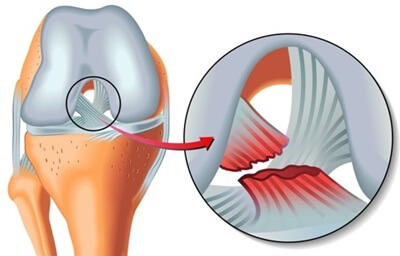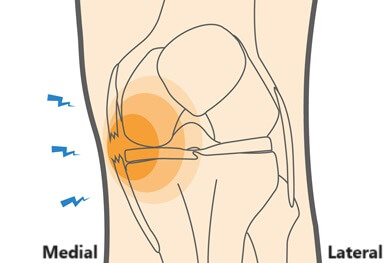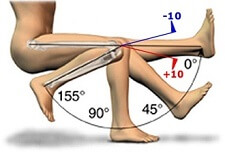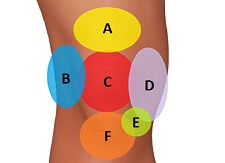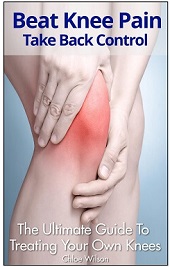- Home
- Knee Symptoms
- Noisy Knees
Knee Pain and Popping
Written By: Chloe Wilson, BSc(Hons) Physiotherapy
Reviewed by: KPE Medical Review Board
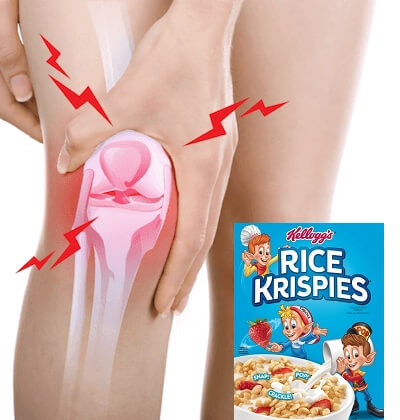
Knee pain and popping is a common problem. It's that tell-tale snap, crackle, pop making your knees sound like a bowl of rice krispies.
Many people find they hear strange noises such as knee clicking when they do things such a squatting down or getting up from kneeling.
In many cases, it is more of a nuisance than a real problem, but in some cases, it may be a sign of an underlying problem in the knee.
Another term commonly used for popping in the knee is "crepitus", which essentially means a noisy joint, whether it be popping, clicking, cracking or snapping.
Here we look at the most common causes of knee pain and popping and how to treat them.
What Causes Knee Pain And Popping?
There are a number of possible causes of knee pain and popping which usually fall into three categories:
- Painful Popping Noise With An Injury: Sometimes when the knee is injured e.g. twisting awkwardly, there is a sudden, loud "pop" at the same time indicating damage to part of the knee. This usually indicates damage to one of the knee ligaments
- Recurrent Painful Popping Noises: Knee pain and popping can come on gradually with no obvious cause. It may happen sporadically or frequently depending on the cause. This is usually due to meniscus tears, arthritis, chondromalacia patella or runners knee
- Pain-Free Popping Knee: Popping noises in the knee often occur without any pain, in which case they are nothing to worry about. This is usually doe to gas bubbles popping or tendons/ligaments snapping
1. ACL Injury
The most common cause of sudden knee pain and popping is an ACL injury.
The ACL is a strong ligament found in the center of the knee, that plays an important role in knee stability.
The ACL typically gets damaged when there is a hard blow to the side of the knee e.g. sporting tackle, sudden twisting e.g. changing direction quickly when wearing cleats, sudden deceleration, or when the leg bends backwards too far which over-stretches and tears the ligament, either fully or partially.
Approximately 50% of ACL tears are accompanied by a loud "pop" associated with immediate swelling and pain and ongoing knee instability.
Knee pain and popping with an ACL tear usually only occurs at the time of the injury, and there isn't typically any recurrent knee clicking or popping afterwards.
Find Out More: ACL Injuries
2. MCL Injury
Another possible cause of sudden knee pain and popping is an MCL tear, where the ligament on the inner side of the knee gets over-stretched and tears.
The medial collateral ligament usually gets torn when a force gores through the outside of the knee e.g. tackle, or sudden twisting e.g. skiing
Typical symptoms of an MCL tear include inner knee pain and popping/tearing sensation, swelling, instability, difficulty bending the leg
Find Out More: MCL Injuries
3. Knee Cartilage Tear
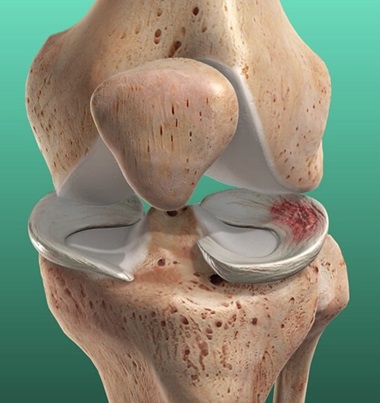
Ongoing knee pain and popping is often the result of a meniscus tear, the special cartilage that lines the joint. When the meniscus tears, small fragments of it can catch in the knee as it moves which results in knee clicking, particularly when bending and straightening the knee.
Meniscus tears can happen suddenly, usually due to awkward knee twisting, or gradually from repetitive wear and tear.
Knee pain and popping from a meniscus tear tends to come and go, rather than happening all the time as the torn fragment moves around the joint.
Meniscus tears are often associated with knee locking, where the knee gets stuck and can't bend.
Find Out More: Meniscus Tears
4. Knee Arthritis
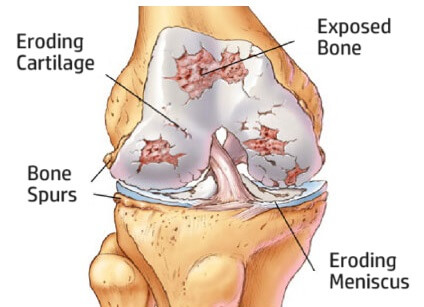
The most common cause of knee pain and popping in people over the age of 60 is knee arthritis. With arthritis, there is wear and tear of the cartilage that lines the knee joint accompanied by the formation of bone spurs, known as osteophytes.
As the cartilage thins, the joint surface becomes rough and friction occurs between the bones resulting in crepitus and knee popping pain.
People with knee arthritis also complain of a toothache type pain, knee stiffness (particularly in the morning) and swelling.
With arthritis, knee pain and popping, clicking and crepitus tend to be persistent with knee movement, rather than coming and going.
Find Out More: Knee Arthritis
5. Chondromalacia Patella
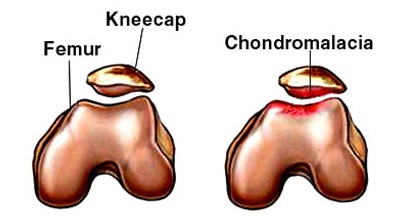
Chondromalacia Patella is a common cause of knee pain and popping in healthy, often sporty adolescents and young adults.
With chondromalacia, there is irritation and inflammation of the cartilage lining the back of the patella (kneecap). This causes friction between the back of the kneecap and the underlying femur (thigh bone), producing a popping or grinding noise.
The knee clicking/crepitus can usually be felt as well as heard when you put your hand over the front of the knee and bend and straighten the knee joint and tends to happen anytime you bend your knee.
Find Out More: Chondromalacia Patella
6. Runners Knee
Runners Knee is a problem in how the kneecap moves which causes an ill-defined ache around the knee and clicking or grinding.
It is also known as anterior knee pain or patellofemoral pain syndrome and it doesn't just affect runners!
In Runners Knee, the patella rubs against the femur which is often associated with a grinding sensation or popping noise when the knee moves.
Symptoms are usually worse with prolonged activity e.g. running, coming downstairs or after prolonged inactivity e.g. office workers
Knee pain and popping tends to come and go with Runners Knee, rather than happening all the time.
Find Out More: Runners Knee
7. Gas Bubbles Popping
Often, painless popping noises in the knee are due to small gas bubbles in the joint popping, known as cavitation.
Changes in joint pressure can cause tiny bubbles of gas to slowly form in joints. When these gas bubbles burst quickly, they make a popping sound, in a similar way to when you pop bubble-wrap.
There is no harm in this case of knee popping no pain, and the myth that it makes you prone to arthritis is unfounded.
8. Soft Tissue Snapping
Ligaments and tendons are soft tissues that are positioned around all the joints in our body. Sometimes when you move your knee, a ligament or tendon may stretch slightly as it goes over a small bony lump and then snaps back into place making a knee clicking sound.
Again, there is no harm with this type of knee clicking if there is no pain, and despite what people often say, it doesn’t make you more prone to knee problems.
This time of knee popping tends to happen a few times as you move the knee and then stops for a period of time, usually returning later.
When To See A Doctor
Knee popping or clicking can often be managed by your regular doctor, but in certain situations, urgent medical attention is needed. Here’s how to know the difference:
When to See Your Regular Doctor
You should schedule an appointment with your primary care physician or an orthopedic specialist if:
- The popping or clicking is persistent or worsening but isn’t causing severe pain.
- You experience mild to moderate pain that comes and goes.
- There is mild swelling or stiffness that doesn’t improve with rest, ice, or over-the-counter pain relievers.
- You have occasional knee instability but can still walk and bear weight.
- You have a reduced range of motion but can still move your knee.
- The popping started gradually over time rather than after an acute injury.
Your doctor can evaluate your symptoms, order imaging if needed, and recommend treatments such as physical therapy, bracing, or medication.
When to Seek Urgent Medical Attention
You should go to an urgent care center or emergency room if:
- Your knee suddenly gives out, and you can’t bear weight.
- You hear a loud pop followed by immediate pain and swelling, which may indicate a ligament tear or severe injury.
- Your knee looks deformed or out of place, which could suggest a dislocation or fracture.
- There is rapid, significant swelling within a few hours of an injury.
- You experience severe pain that does not improve with rest, ice, or medication.
- Your knee is locked in place, meaning you physically can’t straighten or bend it.
- There are signs of infection, such as redness, warmth, fever, or pus draining from the knee.
If you’re unsure whether your symptoms require urgent care, it’s always best to err on the side of caution and get evaluated. Early intervention can help prevent further complications and promote faster recovery.
#CommissionsEarned from Amazon on qualifying purchases
Knee Popping Treatment
Treatment for knee pain and popping depends on the underlying cause of the noises. In many cases, conservative treatments can help, but more serious conditions may require medical intervention.
Home Treatments
For mild to moderate knee pain and popping, try:
- Rest: Avoid activities that worsen the pain and give your knee time to heal.
- Ice Therapy: Apply an ice pack for 15–20 minutes every few hours to reduce knee swelling and pain
- Compression: Use a knee brace or tubigrip compression bandage wrap to support the joint and minimize swelling
- Elevation: Keep your leg elevated on a leg cushion or pillows to help reduce inflammation.
- Pain Relievers: Over-the-counter medications like ibuprofen (Advil) or acetaminophen (Tylenol) can help with pain and inflammation.
- Gentle Exercises: Strengthening the quadriceps, hamstrings, and glute muscles can improve knee stability and reduce popping.
- Physical Therapy: can help with joint mobility, strength and stability with a personalised rehab program and hands-on treatment
Medical Treatments
If knee pain and popping persist despite home care, a doctor may recommend:
- Prescription Medications: If over-the-counter meds aren’t enough.
- Corticosteroid Injections: To reduce inflammation in cases of arthritis or severe irritation.
- Hyaluronic Acid Injections: To lubricate the joint, often used for knee osteoarthritis.
- Bracing or Orthotics: Custom knee braces or shoe inserts can help with alignment and joint support
Surgical Treatment
If conservative treatments fail, surgery may be considered for:
- Ligament Injuries: ACL reconstruction or other ligament reconstructions if there is instability.
- Knee Arthroscopy: Removal of loose cartilage, meniscus or bone fragments that may be causing popping and pain.
- Knee Replacement: For severe arthritis when pain and function don’t improve with other treatments.
You can find out loads more about these common causes of knee pain and popping including the best treatment options for each, by using the links above.
And remember, if you have knee clicking but it doesn’t cause you any pain, don’t worry. It is usually entirely normal and nothing to worry about. You may find that strengthening your leg muscles actually eliminates the noise – see the strengthening exercises section for ideas on where to start.
Knee Popping By Activity
Knee Popping When Extending: Knee popping when you straighten your knee is usually due to gas bubbles (not usually painful), plica syndrome or patellofemoral pain syndrome.
Knee Popping and Pain When Bending: If you get knee popping and pain when bending your knee e.g. squatting down, it is most likely due to a problem with the knee cartilage such as a meniscus tear or chondromalacia patella.
Knee Popping When Extending And Bending: If you get knee pain and popping with both knee flexion and extension, it is likely that there is damage to the joint surface such as cartilage damage or knee arthritis. If there is no pain, it is likely to be gas bubbles popping.
Knee Popping With Twisting: Sudden knee pain and popping when you twist is usually doe to a knee ligament injury, most often an ACL injury and/or MCL tear. If the knee swells up or feels unstable after hearing a pop as you twisted, seek medical attention immediately.
Knee Popping When Walking: Almost all the possible causes of knee popping that we've looked at here can cause knee pain and popping when walking, be it arthritis, runners knee, cartilage tear or ligament injury. There will usually be other symptoms associated here that will lead to a clearer knee pain diagnosis.
Knee Popping No Pain: If there is no pain with your knee popping, chances are it is a simple case of gas bubbles bursting inside the joint which is completely harmless. Keeping active and strengthening the knee muscles can sometimes help to reduce the frequency of knee popping.
Frequently Asked Questions
Will Knee Popping Go Away?
Will Knee Popping Go Away?
In most cases, knee pain and popping will settle down, but how long this takes will depend on what is causing the popping noise. Soft tissue injuries usually heal in 6-12 weeks. Most people notice their knee popping settles down within 3 months of working on knee strengthening exercises.
If there is no pain with the popping, then it is highly likely the popping noises will continue as there isn't a mechanical problem to be fixed. But rest assured, there is no increased risk of knee problems later in life.
Is Knee Popping Bad?
Is Knee Popping Bad?
In most cases, knee popping is not a serious problem, it is simply bubbles of gas popping, or tendons snapping over small, bony lumps.
However, knee popping can be serious if there is a sudden popping noise from the knee at the time of injury, which typically indicates a significant injury to one of the knee ligaments.
Why Do Knees Crack When Squatting?
Why Do Knees Crack When Squatting?
Many people complain of popping, cracking, or crunching noises when they squat down. The technical term for this is cavitation or crepitus, which simply put means "joint noise". Caused by a change in pressure inside a joint, gas bubbles of carbon dioxide form, and when they burst, you get the familiar cracking sound in your knee.
Find Out More: Knee Pain When Squatting
How Do I Crack My Knee Safely?
How Do I Crack My Knee Safely?
If your knee feels like it locks up sometimes, you may find that releasing the pressure in the joint helps. This is only appropriate if there is no knee pain and you have not recently injured your knee.
- Lie down somewhere comfortable
- Stretch your leg out until your knee is straight, toes pointing towards the ceiling
- Keeping your leg straight initially, lift your leg up as high as is comfortable and then slowly bend your knee in and out until you hear a small pop.
Knee Pain and Popping Summary
Knee pain and popping is a common problem that may be intermittent or persistant.
There are lots of different causes of knee popping and clicking. A sudden "pop" with an injury usually indicates a ligament tear e.g. ACL tear or MCL tear.
Ongoing knee pain and popping may be due to a meniscus tear, arthritis, chondromalacia patella or runners knee.
Painless knee popping is usually caused by gas bubbles popping in the knee joint, or one of the knee ligaments or tendons snapping over a bony lump in the knee.
Treatment for knee pain and popping may involve rest, ice, compression, elevation, medication, injections, knee braces, exercises, physical therapy or, in some cases, surgery.
You may also be interested in the following articles:
Related Articles
Medical & Scientific References
- Clinics In Orthopedic Surgery Journal: Noise around the Knee. February 2018
- WikiHow: How to Keep Your Knees from Popping and Cracking. July 2018
- Physical Therapy In Sport: Implications of knee crepitus to the overall clinical presentation of women with and without patellofemoral pain. September 2018
- Musculoskeletal Science and Practice: People's beliefs about the meaning of crepitus in patellofemoral pain and the impact of these beliefs on their behaviour: A qualitative study. April 2017
Page Last Updated: March 19th, 2025
Next Review Due: March 19th, 2027
